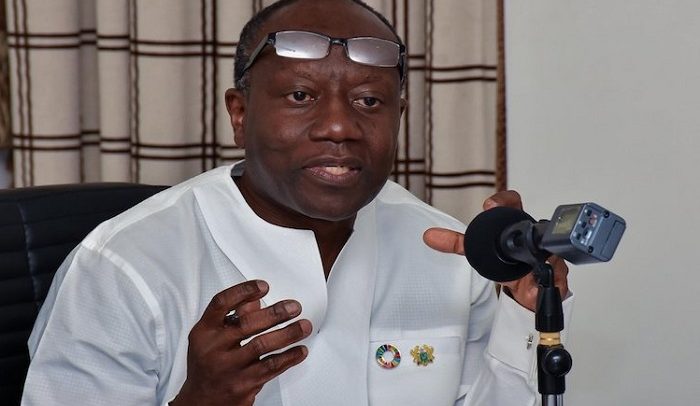Finance Minister, Ken Ofori-Atta has disclosed plans by government to reduce BOST Margin by Gh2p to bring down fuel prices.
Also, according to the Minister, there will also be 50 percent cut in fuel coupons.
Announcing measures to deal with the economic challenges facing the country on Thursday March 24, 2021, he said “The ministry has strengthened its Expenditure Monitoring systems and processes to ensure effective implementation of these measures.
In addition, Government has decided to take the following measures to ensure the achievement of the fiscal deficit target of 7.4% of GDP for 2022:
“Contrary. Expenditure Cutting Measures
i. Discretionary spending is to be further cut by an additional 10%. The Ministry of Finance is currently meeting with MDAs to review their spending plans for the rest of the three (3) quarters to achieve the discretionary expenditure cuts;
ii. these times call for very efficient use of energy resources. In line with this, there will be a 50% cut in fuel coupon allocations for all political appointees and Heads of government institutions, including SOEs, effective 1st April 2022;
“iii. with immediate effect, Government has imposed a complete moratorium on the purchase of imported vehicles for the rest of the year. This will affect all new orders, especually 4-wheel drives.
We will ensure that the overall effect is to reduce total vehicle purchases by the public sector by at least 50 percent for the period;
iv. again, with immediate effect Government has imposed a moratorium on all foreign travels, except pre-approved critical/statutory travels…”
BOST Margin is a tax imposed on petroleum products used to cover the maintenance and operating cost of petroleum product depots and undertaking expansion programs at depots.
The BOST Margin has remained at 3 pesewas per litre since 2011.In December 2019, it almost went up to 6 pesewas per litre but the decision was quickly reversed following intense pressure on government by opposition parties as well as CSOs such as the Chamber of Petroleum Consumers (COPEC).
Touching on the cedi, Mr Ofori-Atta said that despite the challenges facing the country at the moment, the Cedi is doing better than it did in 2014 and 2015 when Mr John Dramani Mahama was the President of Ghana, saying that “In spite of it all, the cedi has held under these extreme challenges better than it did in 2014 and 2015. This is because the fundamentals are much stronger.”
“However, three (3) things that we did not (and could not) predict hit us:
(1) that Parliament would approve Government’s 2022 Budget Statement and its expenditure plans and then turn around to vote against one of the key revenue generation measures that was being introduced, the e-levy.
“(2) That the unyielding stance of the Minority in Parliament against the E-levy would gravely affect investor confidence in our capacity to implement our programmes and settle our debts, triggering a downgrading by credit rating agencies, and now leaving the cedi vulnerable as we could not access the International Capital Market.
“9. Ladies and gentlemen, the third hit was the launch of the attack on Ukraine by Russia on February 24, 2022. The war in Ukraine could not have come at a worse time for the global economy. Already global efforts toward economic recovery from the devastation wreaked by the Coronavirus pandemic were being disturbed by supply chain disruptions, surging inflation, and uncertainties in the financial markets, with anticipated hikes in interest rates.
“10.After February 24 we saw a sharp hike in global oil prices, food price shocks (especially wheat), oil and gas price hikes, capital risk aversion/flight to safety, affecting private capital flows to emerging among others.”
By Vincent Kubi


